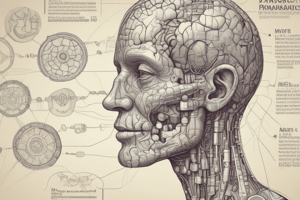Podcast
Questions and Answers
What is the primary focus of CNS pharmacology?
What is the primary focus of CNS pharmacology?
- The study of the effects of drugs on the Central Nervous System (CNS) (correct)
- The study of the effects of drugs on the Autonomic Nervous System (ANS)
- The study of the effects of drugs on the Somatic Nervous System (SNS)
- The study of the effects of drugs on the Peripheral Nervous System (PNS)
What is the role of receptors in CNS pharmacology?
What is the role of receptors in CNS pharmacology?
- They break down neurotransmitters
- They stimulate ion channel activity
- They bind to drugs, activating or inhibiting neuronal signaling pathways (correct)
- They produce neurotransmitters
Which type of drug is used to induce unconsciousness and immobility?
Which type of drug is used to induce unconsciousness and immobility?
- Sedatives and hypnotics
- Anesthetics (correct)
- Antidepressants
- Antipsychotics
What is the term for increasing the effect of a drug?
What is the term for increasing the effect of a drug?
What is a challenge in CNS drug development?
What is a challenge in CNS drug development?
What is a strategy in CNS drug development?
What is a strategy in CNS drug development?
Flashcards
CNS Pharmacology
CNS Pharmacology
The study of how drugs affect the central nervous system, including the brain and spinal cord.
Neurotransmitters
Neurotransmitters
Chemicals that transmit signals between neurons. Drugs can affect their synthesis, release, or reuptake.
Sedatives and Hypnotics
Sedatives and Hypnotics
Drugs that reduce anxiety and promote sleep via mechanisms like interacting with GABA receptors.
Antipsychotics
Antipsychotics
Signup and view all the flashcards
Antidepressants
Antidepressants
Signup and view all the flashcards
Agonist
Agonist
Signup and view all the flashcards
Study Notes
CNS Pharmacology Overview
CNS Pharmacology Definition
- Study of the effects of drugs on the Central Nervous System (CNS)
- CNS includes the brain and spinal cord
Mechanisms of Drug Action
Receptors
- Drug binding to specific receptors on neurons or glial cells
- Activates or inhibits neuronal signaling pathways
Neurotransmitters
- Chemical messengers that transmit signals between neurons
- Examples: dopamine, serotonin, acetylcholine, norepinephrine
- Drugs can affect neurotransmitter synthesis, release, or reuptake
Ion Channels
- Proteins that regulate ion flow across neuronal membranes
- Drugs can modulate ion channel activity, affecting neuronal excitability
CNS Drug Classification
Sedatives and Hypnotics
- Reduce anxiety and promote sleep
- Examples: benzodiazepines (e.g., alprazolam), barbiturates
Antipsychotics
- Treat psychotic disorders, such as schizophrenia
- Examples: dopamine receptor antagonists (e.g., haloperidol), atypical antipsychotics (e.g., clozapine)
Antidepressants
- Treat depression and other mood disorders
- Examples: selective serotonin reuptake inhibitors (SSRIs, e.g., fluoxetine), tricyclic antidepressants (e.g., amitriptyline)
Anesthetics
- Induce unconsciousness and immobility
- Examples: general anesthetics (e.g., propofol), local anesthetics (e.g., lidocaine)
Stimulants
- Increase alertness and energy
- Examples: amphetamines (e.g., dextroamphetamine), methylphenidate
CNS Drug Effects
Agonism and Antagonism
- Agonists: enhance or mimic neurotransmitter activity
- Antagonists: block or reduce neurotransmitter activity
Potentiation and Inhibition
- Potentiation: increase drug effect
- Inhibition: decrease drug effect
CNS Drug Interactions
Pharmacokinetic Interactions
- Affect drug absorption, distribution, metabolism, or excretion
- Examples: enzyme induction or inhibition, protein binding
Pharmacodynamic Interactions
- Affect drug response or efficacy
- Examples: additive, synergistic, or antagonistic effects
CNS Drug Development
Challenges
- Blood-brain barrier: limits CNS drug delivery
- Complexity of CNS function: difficult to target specific mechanisms
- Adverse effects: may impact CNS function or other bodily systems
Strategies
- Designing drugs that target specific CNS receptors or mechanisms
- Using drug delivery systems to bypass the blood-brain barrier
- Developing drugs with improved safety and efficacy profiles
Studying That Suits You
Use AI to generate personalized quizzes and flashcards to suit your learning preferences.




